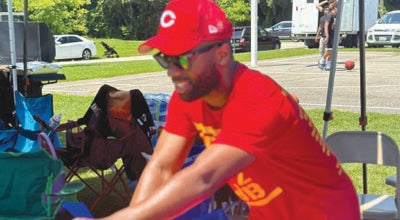Roads Gets Forty Years
Published 6:02 pm Thursday, September 1, 2011
CUMBERLAND – Tenth Judicial Circuit Court Judge Leslie Osborn sentenced Tyrone Tyree Roads, of Powhatan, to 40 years in jail on Tuesday for the murders of Barry Shaver and Ricky Thurston that occurred in June of 2009 in the Lakeside Area of Cartersville.
Roads was arrested in Richmond without incident in connection with the double homicide that occurred in the county on June 12, 2009 when he was 21 years old and charged with capital murder in the slayings of Shaver, the female victim, and Thurston, the male victim, at their residence.
After considering the presentence investigation report, evidence that was entered by Cumberland's Commonwealth's Attorney, Patricia Scales, and Defense Attorney David P. Baugh, and after also hearing testimony from witnesses, and closing summaries, Judge Osborn explained to Roads that the sentencing hearing on the amended first-degree murder charges, because of a plea agreement, is “about you today…That's the long and short of it.”
“You were responsible for dealing it to these folks,” said Judge Osborn to Roads about his choice to deal cocaine and go to the victims' house to collect “his money on a cocaine debt.” “It was in their systems. That is a fact of this case…”
On each of the amended first-degree murder charges, Roads was sentenced to 50 years with the sentences to run consecutively with another, Judge Osborn announced, with 30 years suspended for each. He will also have supervised probation for 10 years upon his release.
The total years he will serve, according to the Circuit Court Clerk, Carol Ownby, is 40 years.
To begin, Ms. Scales introduced the autopsy reports for both Shaver and Thurston and said that Shaver was stabbed “more than 60 times” and Thurston was stabbed “more than 40 times.”
Cumberland's Commonwealth's Attorney also introduced photographs on a CD and a video that was taken by the camera housed on a Cumberland Sheriff's Deputy's patrol car when the deputy encountered Roads in 2009 as evidence. The transcript of a 911 call made by Roads “in the days following the murders” was also submitted. The photographs, video, and transcript were sealed from the public to protect the families, according to Judge Osborn.
Ms. Scales called three witnesses to testify during the sentencing hearing. They were family members of the two victims-Jessica Shaver, Austin Shaver, Ashley Shaver and Linda Thurston Dunnavant. Ms. Scales asked each how the murders have affected their families?
“Everyday you can't get away from it…,” said Jessica. She also testified that she has since moved out of the county and now lives in another area.
Austin testified that he has moved five or six times since the murders and suffers from an anxiety disorder.
“Nothing will ever be the same,” said Ms. Dunnavant. “…It makes you very angry. I can't forgive… Not at this time. I can't do it.”
Later, Defense Attorney Baugh described circumstances that “put the issues in motion,” he said.
He spoke about how Roads grew up in poverty without running water and how his development issues went untreated throughout his childhood and how his father was “horrible.”
Baugh called Brenda Watson as a witness to testify. Roads is her nephew. She testified that Roads' father would become “very violent” when he was intoxicated. She also testified that Roads' mother had died from multiple sclerosis.
Later, Dr. William Bernet, a professor of psychology at Vanderbilt University School of Medicine in Nashville, Tennessee, testified for the defense concerning a gene, Monoamineoxidase A (MAO-A). He testified that there is a “low activity version” and a “high activity version.”
The low activity version combined with a history of abuse “doesn't force you to be violent but it increases your risk,” said Dr. Bernet about Roads having the genetic marker. Baugh explained that Roads' genetic code was tested and that Dr. Bernet also interviewed him.
The third witness called by the Defense Attorney was Dr. William J. Stejskal, a licensed psychologist in Virginia.
Baugh stated that he also examined Roads on three occasions.
Ann Tackett, a former Cumberland County juvenile probation officer, also testified for the defense. She told Judge Osborn that Roads was taken into custody in 2003 and placed in the Piedmont Regional Juvenile Detention Center when a circumstance arose at home. He was placed for the night. She testified that when the detention hearing was held his parents did not show up so she notified child protective services and filed a complaint with the Cumberland Department of Social Services.
“I filed a complaint for not coming to court with Cumberland social services…,” testified Ms. Tackett.
She also testified about a malicious wounding charge against Roads and bullying allegations from the school system during her time as his probation officer.
At closing, Ms. Scales noted that the spotlight “belongs on him, Tyrone Tyree Roads…
“Two people were stabbed more than 100 times,” she said.
Ms. Scales also explained to the Court that Roads “pled guilty to first degree murder” and “now it's for the court to decide.”
According to Ms. Scales' summary, Roads went to the residence on June 12, 2009 “to get his money” that Thurston owed him in the amount of $1,500.
“While there the confrontation arose,” she continued.
“He was violent then and he is violent now,” she added.
Then Ms. Scales asked Judge Osborn for the maximum sentence allowed by the guidelines of Virginia-44 years and one month.
Defense Attorney Baugh said, “I have to ask for the minimum of 26 years.”
“He's not going to be the same man…,” advised Baugh about when Roads is released at an older age. “Allow him to be released in 2037.”
In his closing, Baugh said, “Everything that could go bad did go bad,” he said.
Later, Baugh advised that Roads was “blameworthy for this crime, yes” but “not for the events prior” concerning the circumstances surrounding his family life.





